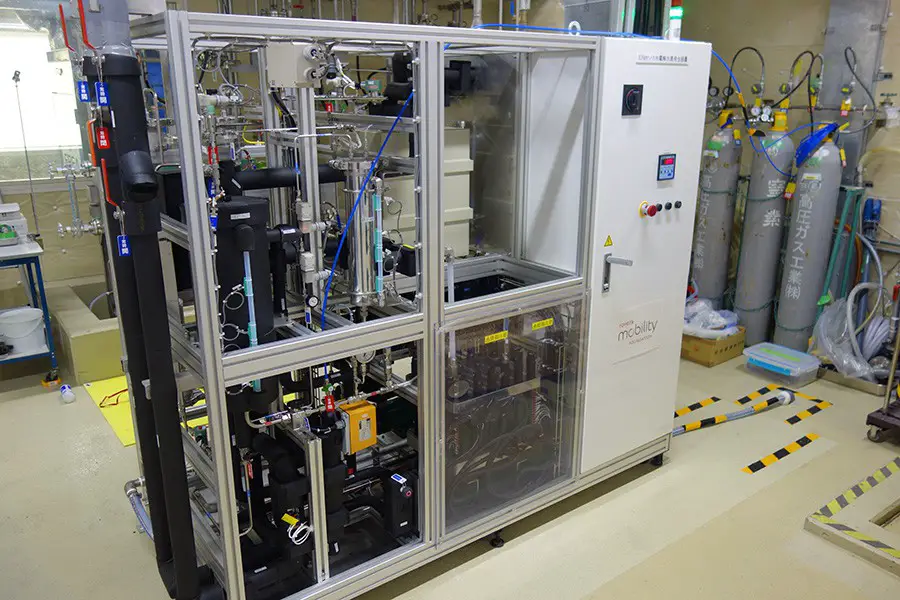
International Journal of Hydrogen Energy publishes Toyota-supported research
February 14, 2023Toyota Mobility Foundation (TMF) supported an important H2 study.
Toyota Motor Corporation recently announced that the results of TMF-supported joint research into hydrogen energy solutions has been published in world-renowned scientific journal, the International Journal of Hydrogen Energy.
TMF has been dedicated to supporting research involving hydrogen solutions.
In 2017, the Toyota Mobility Foundation established the “Research Program to Support Innovative Hydrogen Energy Solutions,” which focuses on lowering green hydrogen costs across the entire H2 supply chain of producing, transporting, and using hydrogen.

In 2021, the foundation began a new joint research program to be carried out by teams of researchers. In this program, two working groups were formed, and each focused on one of two important themes: “Hydrogen Society & Energy System” and “Water Electrolysis.” Five researchers each were selected from these working groups under TMF’s “Research Program to Support Innovative Hydrogen Energy Solutions.”
The research team began investigating using a practical water electrolysis device, based on information they obtained through conducting literature reviews on water electrolysis systems and the impact renewable energy power fluctuations have on these systems.
Generating power from renewable sources, such as wind and solar, fluctuates depending on the time of day and the weather. However, producing a large amount of renewable energy is essential for a decarbonized society to become real. The hope is that hydrogen can help adjust and regulate power fluctuations, and water electrolysis is the vital technology required to convert that energy.
The water electrolysis device the researchers used at the National Institute of Advanced Industrial Science and Technology Fukushima Renewable Energy Institute to conduct their research, was a solid polyer (PEM) type water electrolysis H2 generator with a 10Nm3/h hydrogen production capacity.
The hydrogen energy research focuses on renewable energy power fluctuations and green hydrogen.
The title of the review article published in the journal is “Influence of renewable energy power fluctuations on water electrolysis for green hydrogen production.” Authors that contributed to the article include Hirokazu Kojima (National Institute of Advanced Industrial Science and Technology), Kensaku Nagasawa (Yokohama National University), Naoto Todoroki (Tohoku University), Yoshikazu Ito (University of Tsukuba), Toshiaki Matsui (Kyoto University), Ryo Nakajima (techno2050 NAKAJIMA PE Office TMF Advisor).
In their hydrogen energy research, the authors investigated an array of issues for each main water electrolysis method, including restrictions on using renewable energy as a power source for water electrolysis, catalyst degradation, and the durability of water electrolyzers. The researchers described the performance requirements for water electrolysis systems as well as the materials that can adapt to clean energy fluctuations and the issues that need to be examined moving forward.
To date, what makes this particular review article notable is that it is one of only a few published studies that used actual electrolysis equipment to analyze the behavior, performance degradation, and effect on durability caused by renewable energy power output fluctuations. It is expected that the study results will contribute to finding solutions that are needed to improve performance and lower the costs of water electrolysis.



 HFN News is your leading source for fresh hydrogen and renewable energy updates. Amid the fast-paced growth of hydrogen companies, we provide top-notch news and insights about this exciting sector. Our coverage spans from hydrogen cars to global sustainable initiatives, and we highlight the latest in green jobs and developing hydrogen hubs. We invite you to share your local hydrogen news and explore today’s renewable energy job listings on our site. Thanks for choosing HFN News as your trusted guide to the hydrogen and renewable energy world!
HFN News is your leading source for fresh hydrogen and renewable energy updates. Amid the fast-paced growth of hydrogen companies, we provide top-notch news and insights about this exciting sector. Our coverage spans from hydrogen cars to global sustainable initiatives, and we highlight the latest in green jobs and developing hydrogen hubs. We invite you to share your local hydrogen news and explore today’s renewable energy job listings on our site. Thanks for choosing HFN News as your trusted guide to the hydrogen and renewable energy world!